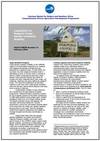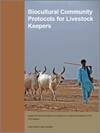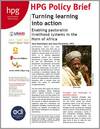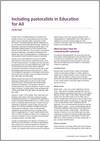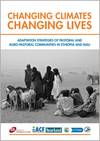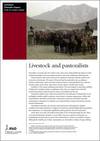Lessons from West Africa indicate cross-border mobility needs to be addressed within a comprehensive policy, legal and institutional framework that harmonizes national and regional legislation to secure livestock mobility from the local to the regional level. At regional level, the ECOWAS decision agreed in Abuja in October 1998 provides a regional framework for cross-border transhumance between fifteen member states.
Year of publication: 2010Organization: Marché commun de l’Afrique orientale et australe
Topic: Conflit, Participation
Language: English
Type of document: Politiques et législation
Geographical coverage: Afrique occidentale, Afrique orientale, Afrique australe
Biocultural community protocols are a new approach with great potential for empowering pastoralists and other traditional livestock-keeping communities. They are both a process and a document in which communities invoke their rights as guardians of biological diversity under Article 8j of the United Nations Convention on Biological Diversity. Claiming rights for in-situ conservation, they also help promote livestock keepers’ rights to maintain their breeds and continue their traditional management practices.
Biocultural community protocols put on record traditional knowledge and the biodiversity that communities steward, in a process that the communities themselves drive. In developing a biocultural community protocol, communities become informed about national and international laws that protect their rights. This book provides an overview of the process as well as its legal background and describes the first experiences with implementing this approach by livestock keepers in Asia and Africa.
Year of publication: 2010Organization: , Ligue des peuples pasteurs (LPP)
Topic: Les savoirs autochtones, Organisation, Participation
Language: English
Type of document: Technique
Geographical coverage: Global
This policy brief argues the need for national strategies to guide development actors and help enhance the impact of aid interventions. There is also a need to close the gap between the theory and practice of pastoral development by supporting longer-term investments and programme strategies, ensuring that good practices are adopted, and bridging the gap between development and emergency relief efforts.
Year of publication: 2010Organization:
Topic: Sécurité alimentaire
Language: English
Type of document: Technique, Politiques et législation
Geographical coverage: Afrique orientale
There is new interest and willingness to look afresh at how formal schooling can become compatible with pastoralism. It is becoming clear that Education for All requires a re-thinking of how pastoralists make a living and thus how formal education fits. Pastoralism is and will remain the main economic driver in most dryland regions of Africa, and is important also in semi-arid areas and mountainous highland regions in South Asia. This document presents the problem of the school-based model of formal education and discusses inclusive approaches to pastoral education.
Year of publication: 2010Organization: Auteurs individuels
Topic: Éducation
Language: English
Type of document: Technique
Geographical coverage: Global
This report explores the implications of climate change for pastoralists and agro-pastoralists in Ethiopia and Mali. The focus of the report is on local perceptions of changes in climate shocks and stressors. It examines how people respond to these changes, and what constraints they face. Examining local perceptions and responses to change is important because these can help to identify more precisely what support pastoralists require to strengthen their climate resilience. It will also help identify specific constraints that different actors and groups face, and also uncover a more holistic understanding of adaptation in relation to particular socio-economic, political or historical contexts. Drawing on local perceptions, policy makers will be better informed of the impacts of climate change as they are felt on the ground, the challenges and opportunities that pastoralists face in adjusting their livelihoods, and what further assistance should be provided.
Year of publication: 2010Organization: Auteurs individuels
Topic: Changement climatique, Sécurité alimentaire, Les savoirs autochtones, Peuples autochtones, Résilience
Language: English
Type of document: Technique
Geographical coverage: Afrique occidentale, Afrique orientale
Today there are nearly 200 million pastoralists in the world generating income where conventional farming is limited or not possible. However, pastoral communities are marginalized and generally not given due consideration in wider socio-political analysis. This brief paper presents new challenges and opportunities for pastoralism and key issues and questions in project design.
Year of publication: 2009Organization: Fonds international de développement agricole (FIDA)
Topic: Économie, Organisation, Participation, Résilience, Value addition
Language: English
Type of document: Technique
Geographical coverage: Global
Equitable and secure access to land is a critical factor for the rural poor, especially livestock owners, who depend on agriculture and animal-related activities for their livelihood. This thematic paper is based on the assumption that secure investments in livestock infrastructure and assets can be encouraged by ensuring equitable and secure access to land, and that this approach will help reduce rural poverty. To this end, it identifies experiences and lessons learnt regarding livestock and land-related issues, drawing on experiences from IFAD development projects and programmes all over the world, with a special focus on Africa. It examines the following interrelated issues: livestock and access to land, access to reliable sources of water, encroachment, land degradation, grazing and mobility.
Year of publication: 2009Organization: Fonds international de développement agricole (FIDA)
Topic: Économie, Régime foncier, Value addition
Language: English
Type of document: Technique
Geographical coverage: Afrique du Nord, Afrique occidentale, Afrique centrale, Afrique orientale, Afrique australe
This paper addresses the challenge of educating nomadic peoples in the context of rapid global socio-economic change. First, it maps out the conceptual terrain, analysing the key debates in relation to terms that are often misleadingly used as if they are interchangeable – education, schooling, and learning. Second, the paper reviews successful and innovative approaches to education provision around the world that can inform and inspire new approaches to nomadic education.
Year of publication: 2009Organization: Institut international pour l'environnement et le développement (IIED)
Topic: Éducation
Language: English
Type of document: Scientifique
Geographical coverage: Global


